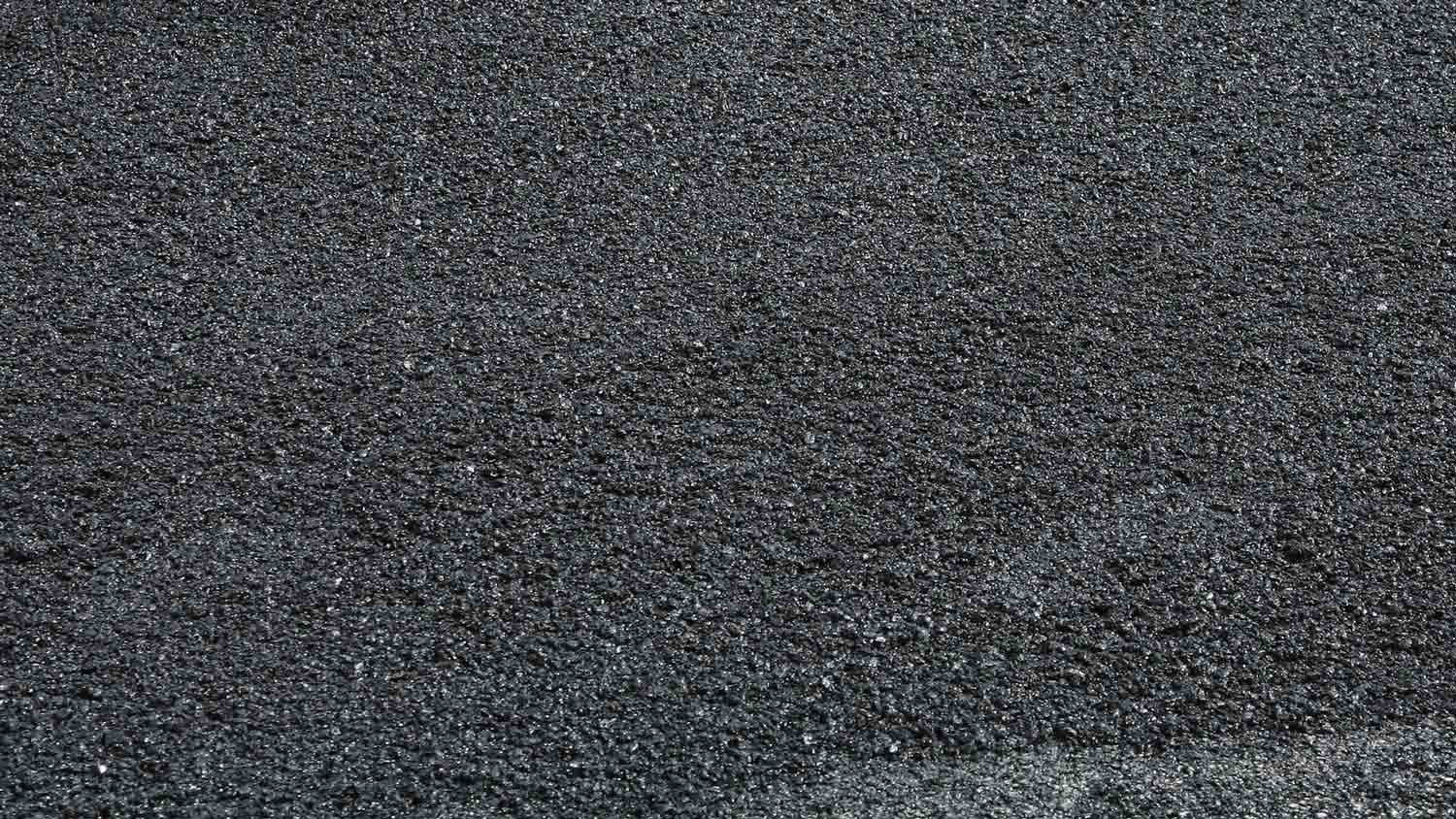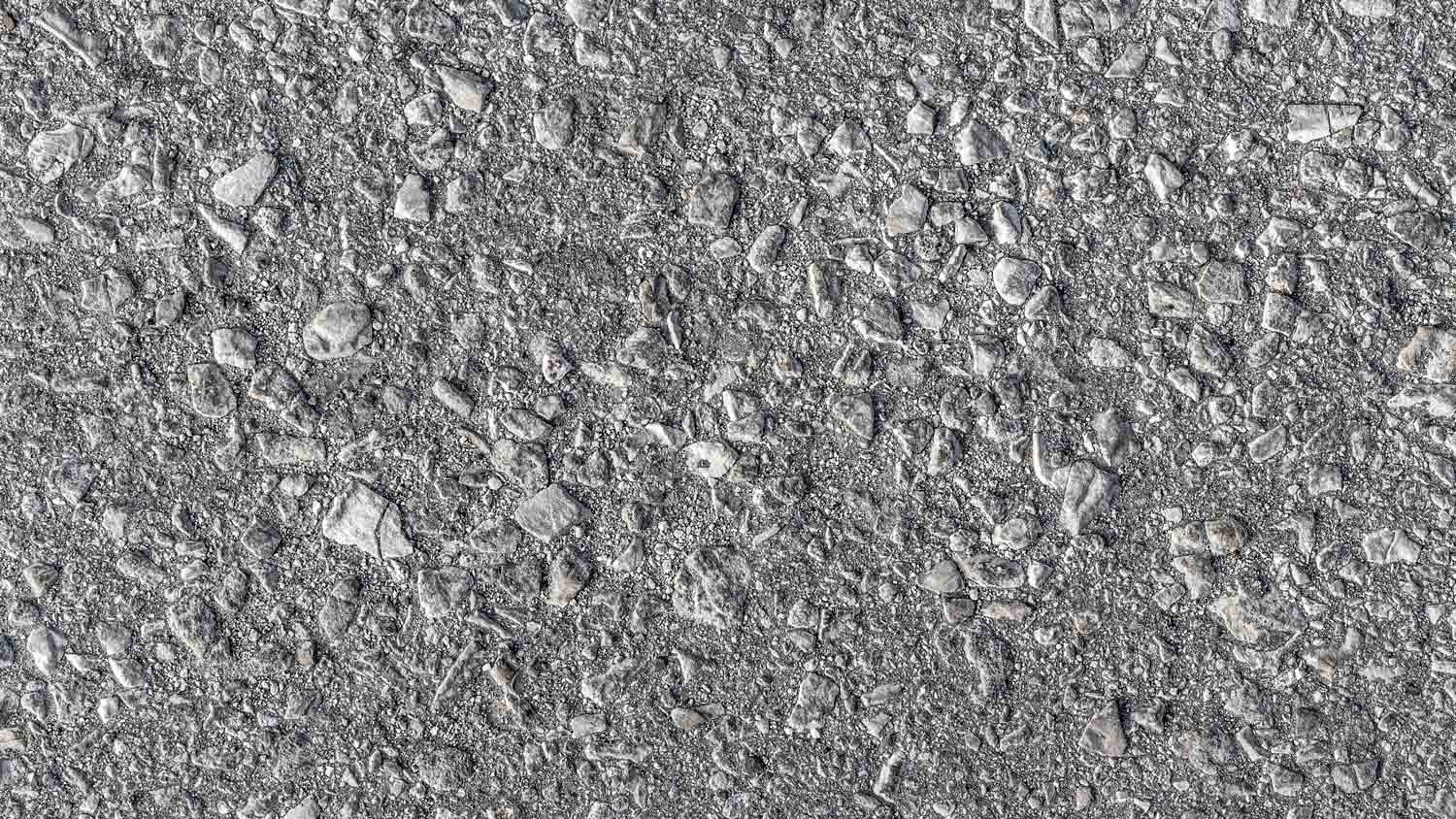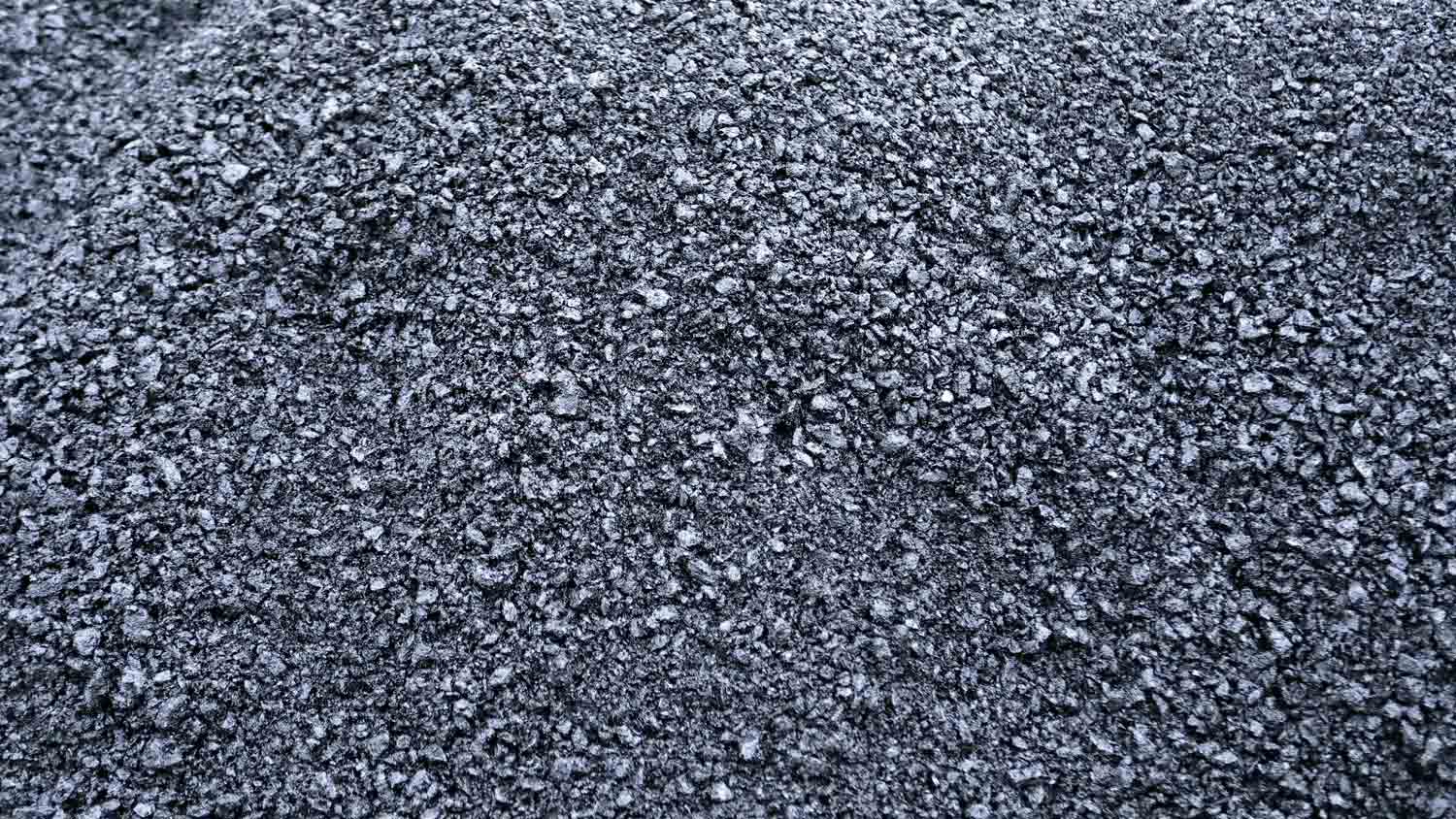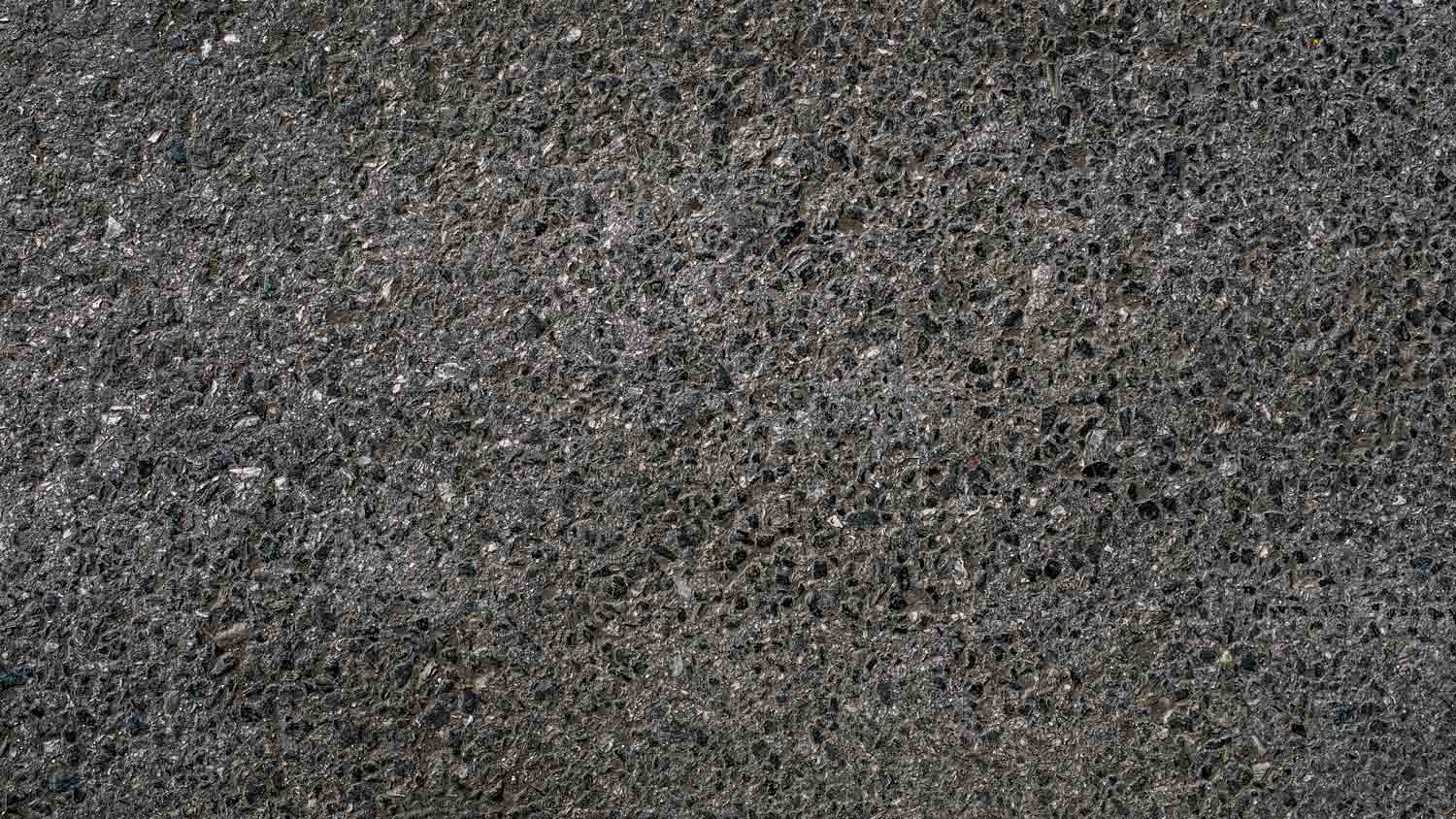6 Types Of Asphalt for Driveways
Paving the way to success starts with knowing your options


You’ve narrowed down the driveway types and settled on asphalt as the winning material—but not all asphalt is made equal. With six different types of asphalt available for your driveway, knowing which one to choose could make a huge difference in the safety and effectiveness of your new driveway. We’ve rounded up the most common asphalt materials and investigated the pros and cons of each one so that you can make an informed decision.
1. Hot Mix Asphalt

When cruising down the road, you’re likely driving on what is known as hot mix asphalt (HMA). This type of asphalt is most commonly used on surfaces with heavy traffic because it’s comprised of any combination of fine or coarse aggregates and a binder. This combo creates one of the most weather-resistant asphalt surfaces.
HMA gets its name from the high heat used in the mixing process and delivery. The asphalt is heated above 300 Fahrenheit when mixed at the mixing facility. From there, it’s delivered to your home hot, placed at a hot temperature, compacted, and then it cools quickly to form your asphalt pavement. Since HMA cools fast, it’s important to work with a driveway paving company near you that’s familiar with working with this asphalt.
HMA asphalt is one of the best types of asphalt to use in paving due to its durability, but it does tend to cost more than other types of asphalt. This asphalt costs around $7 to $13 per square foot on average. Another downside is that HMA can’t be applied if temperatures are below 40 degrees because the cold will cause the asphalt to cool too fast to apply.
| Pros | Cons |
|---|---|
| Can handle heavy traffic | Higher cost |
| Durable | Can’t be applied under 40 degrees |
| Cures quickly | Requires a pro |
Best for: Homes in warmer climates with high traffic or heavy-duty, slow-moving vehicles
2. Dense-Graded Mix Asphalt

Dense-graded asphalt is a type of HMA made from fine- or coarse-graded aggregates. The aggregates are densely designed to achieve one of the densest and most impermeable driveway materials on the market. This type of asphalt can handle the heaviest of traffic, making it suitable for busy roads.
Since this material is so impermeable, your driveway is less likely to crumble or crack during the freeze-thaw cycle, making it a good choice for homes in freezing climates. However, since dense-graded mixes are a type of hot-mix asphalt, you’ll find they have similar cons regarding price and application.
| Pros | Cons |
|---|---|
| Freeze-thaw cycle resistant | Needs a pro to install |
| Heavy-duty | Higher cost |
| Durable | Must be applied above 40 degrees |
Best for: Driveways with climates most at risk of damage from freeze-thaw cycles or heavy-duty traffic
3. Warm Mix Asphalt

As the name suggests, warm mix asphalt (WMA) uses warm temperatures during the manufacturing process. While it has a similar production method as hot mix asphalt, the temperature range for this asphalt falls anywhere between 200 and 250 degrees.
This lower temperature means that less energy is needed to manufacture WMA, making it more environmentally friendly compared to HMA. Research from the Illinois Asphalt Pavement Association Scholarship suggests that WMA can save up to 30% of energy if used as a replacement for HMA. The cooler temperatures also mean that installation professionals aren’t exposed to as many fumes, smoke, and debris during the paving process.
There are some downsides to choosing this type of asphalt. For one, WMA uses more binding materials, water, and other additives to help the asphalt spread at lower temperatures, which may have unknown effects on the environment. Additionally, WMA is more susceptible to water damage than HMA and may not perform as well.
On the plus side, you’ll pay less to have warm mix asphalt for your driveway. Another advantage is that WMA doesn’t cool as quickly as HMA. It’s a suitable replacement for homeowners looking to install HMA on their driveways during colder months when that isn’t an option. You can use WMA on driveways, roads, paths, and more.
| Pros | Cons |
|---|---|
| Safer and more energy-efficient | Contains more additives |
| Lower cost | Susceptible to water damage |
| Can be applied in cooler temperatures | May not be as durable as HMA |
Best for: Cooler climates and those wanting to avoid installation fumes
4. Cold Mix Asphalt

You’ve probably already guessed it, but cold mix asphalt is a type of asphalt mix that’s made without using heat. The result is an asphalt driveway that takes a longer time to cure and harden. CMA driveways aren’t as durable or firm as WMA or HMA driveways, but they do have some benefits worth considering.
For example, since it’s already cold, you can apply cold mix asphalt in extremely low temperatures. CMA also serves as a great temporary option for driveways or even a cheap driveway repair cost option, and it repels water. If you’ve got a pothole you’re itching to fix but it’s freezing outside, CMA is your go-to quick fix.
Homes that receive moderate traffic should skip using CMA entirely because it has a short life span and can’t withstand the traffic. If you live in a rural area and want the most affordable asphalt you can find, however, cold mix asphalt could be a good short-term option.
| Pros | Cons |
|---|---|
| Affordable | Not durable |
| Applicable in cold temperatures | Slow cure time |
| Useful for temporary repairs | Can’t handle moderate traffic |
Best for: Driveway repairs or low-traffic driveways for those on a budget
5. Porous Asphalt

Also known as open-graded friction course (OGFC) and permeable European mix, porous asphalt contains a high ratio of coarse aggregates and a lower ratio of fine aggregates. The coarse aggregates are mostly uniform, which allows for amounts of air pockets to develop throughout the asphalt once dry.
If you’re looking for the most environmentally friendly asphalt material, then porous asphalt is the best choice for your driveway. The air voids make this asphalt far more permeable than your typical, impermeable asphalt, allowing for excellent rainwater drainage.
In addition, if you live on a slope or in a region with high rainfall, this pavement surface can help prevent hydroplaning. Not only that, but porous asphalt is quieter to drive on, making it a good option for those looking for peace and quiet as they enter or exit their driveways. You spend between $3 and $8 per square foot to install porous asphalt, which is about half the cost of standard HMA.
Even with all of these perks, there are a few downsides to porous asphalt. Firstly, your soil type can make or break this type of asphalt. Heavy clay soil has poor drainage, so porous pavement can actually cause issues if there’s no place for the water to go once it filters through the pavement. Porous pavement is also not ideal for driveways with very high traffic and requires more maintenance for removing particle buildup due to its air voids.
| Pros | Cons |
|---|---|
| Promotes water drainage | Not suitable for clay soil |
| Environmentally friendly | Can’t handle heavy-duty traffic |
| Low cost | Requires more maintenance |
Best for: Homes with well-draining soil that receive heavy rainfall
6. Stone Matrix Asphalt

Also called stone mastic asphalt, stone matrix asphalt (SMA) is another type of HMA, so it lifecarries the same advantages and disadvantages but with a slight twist. SMA is designed to maximize the durability of asphalt surfaces and boost rutting resistance. Rutting happens when your car puts too much repetitive strain on the driveway, causing surface depressions.
SMA is an impermeable material that has improved frictional resistance and reduced noise because of its sound-absorbing properties. In addition, it can also stay stable in higher temperatures and under frequent exposure to water.
Considered one of the most premium types of asphalt, SMA also happens to be the most expensive asphalt by around 20% to 25%, putting costs around $8.50 to $16.25 per square foot. However, it contains durable aggregates, modified binders, and a high content of asphalt, which gives it a longer life span.
| Pros | Cons |
|---|---|
| Rutting-resistant | Highest cost |
| High heat tolerant | Not ideal for water drainage |
| Longest life span | Must be applied in temperatures above 50 degrees |
Best for: Sloped driveways where frictional resistance best aids in safe driving and walking
Things to Consider When Choosing Asphalt
Before we dive into the different types of asphalt, it’s important to understand the major differences between asphalt mixtures. Let’s break down how the amount of drainage and the amount of traffic your asphalt will receive can affect which type you choose.
Permeable vs. Impermeable Asphalt
There are two overall types of asphalt you can choose for your home: permeable and impermeable asphalt.
Permeable Asphalt
If drainage is a major concern for your driveway, then you might want to consider choosing a permeable driveway option. Porous asphalt is the main permeable asphalt option on the market, as we’ll break down for you in the following section. This asphalt has properties that allow water to drain through the pavement into the ground or material below.
Keep in mind that asphalt-treated permeable bases (ATPB) can go underneath dense, impermeable asphalt to aid in filtration.
Impermeable Asphalt
Impermeable asphalt, on the other hand, is a dense-graded mix that is more on the impermeable side. Most asphalt falls into this category to some extent. Water can’t percolate into the soil if you go for this option. This means that rainwater will flow down the surface and into storm drains.
According to the University of Delaware’s College of Agriculture and Natural Resources, impermeable surfaces can negatively impact the environment by introducing contaminants from water runoff into bodies of water, harming biodiversity. For this reason, you might want to consider choosing permeable paving for your home to allow for water runoff to drain into the surrounding area and prevent flooding.
Amount of Traffic
The type of asphalt you choose isn’t the only factor that can impact the quality and life span of asphalt. You’ll also want to consider the amount of traffic your surface will receive.
Your average driveway needs a three-inch thick material. High-traffic areas, however, need thicker asphalt of around four to five inches and a stronger sublayer. Hot mix asphalt is ideal for high-traffic driveways, but if you have heavy vehicles, then you might need premium asphalt like stone matrix asphalt.
Light-traffic surfaces benefit more from fine-graded asphalt as opposed to coarse, dense-graded asphalt. The finer the grading, the lower the permeability. Meanwhile, high-traffic surfaces benefit more from a coarse asphalt mix than using a binding agent. You’ll find coarse-grade mixtures used in parking lots, major roads, and driveways.
Frequently Asked Questions
Instead of a set number of types, asphalt comes in variations designed for different needs. Some are categorized by temperature—hot mix, warm mix, and cold mix. Others are sorted by composition, like dense-graded, gap-graded (such as Stone Matrix Asphalt), porous, and mastic asphalt. There are also modified versions with added compounds like polymers, rubber, or emulsions. Instead of focusing on a number, it may be more useful to understand how contractors customize asphalt for durability, climate, and traffic conditions.
There’s no single best asphalt grade—it all comes down to where and how it’s used. Highways and heavy-traffic roads need something tough, like polymer-modified asphalt (PMA) or Stone Matrix Asphalt (SMA). Local roads and parking lots rely on the Performance Graded (PG) system, chosen based on climate. A PG 64-28 mix, for example, handles a broad temperature range while simpler, more cost-effective mixes are typically enough for residential driveways. The best grade of asphalt depends on traffic, weather, and your budget, which is why a professional’s input is always a smart move before making a decision.
A solid driveway starts with the right asphalt mix, and for most homes, dense-graded hot mix asphalt (HMA) is the most recommended. It’s both durable and flexible, making it a reliable choice for residential use. A properly compacted 2-3 inch layer on a well-prepared crushed stone base will hold up for years. In areas with harsh winters or scorching summers, a slightly modified mix can help prevent cracking and rutting. No matter the climate, quality installation is just as important as the material itself, so hiring an experienced contractor ensures a smooth, long-lasting driveway built to last.



- The Ultimate Guide to Asphalt Maintenance
- How Long Until You Can Drive on New Asphalt?
- How Long Does it Take for Asphalt to Dry and Cure?
- Recycled Asphalt Driveways: Everything You Need to Know
- Asphalt vs. Concrete Driveways: What’s the Difference?
- Concrete vs. Asphalt in Cold Climates
- 6 Tips to Extend the Lifespan of Your Asphalt Pavement
- Learn the Pros and Cons of Asphalt Shingle Roofing
- How Long Do Asphalt Shingles Last? Here’s What to Know
- Asphalt vs. Fiberglass Shingles: Pros, Cons, and Costs
















